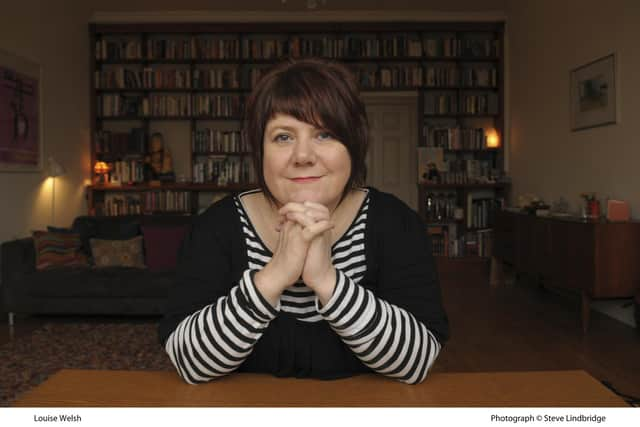Book review: To The Dogs, by Louise Welsh
Something bothered me when I took this novel out of its envelope before Christmas and didn’t stop niggling me until after I had finished reading it. It was, I am afraid, the cover, which I could not stop decoding. The author’s name is in a font size marginally bigger than the title of the novel, and the title is in capitals whereas the name is in upper and lower case. The image – which Welsh describes in the acknowledgements as a “Caspar David Friedrich gothic delight of a cover” – is suitably crepuscular and more importantly recognisably Glaswegian. It didn’t particularly evoke Friedrich for me, but it has a solitary figure, back to the viewer, and inclement weather. Then there are the blurbs (in a sans serif font this time, unlike the rest): Val McDermid claims Welsh writes, “stories that nobody else dares”, on which more anon. But the header was the part that snagged me: “From the award winning author of THE CUTTING ROOM”.
A brief recap is in order. The Cutting Room, Welsh’s debut novel, was written 22 years ago. Two years ago she published a sequel, The Second Cut. In between she wrote eight other novels, including the under-rated Plague Times trilogy of speculative novels, a novella about Christopher Marlowe and standalone titles – my favourite is probably the evocative Naming The Bones. To The Dogs is not a bad novel, in that I did not resent reading it. But it feels like treading water, a feeling aggravated by the cover quote of past glories.
Advertisement
Hide AdTo The Dogs swerves the big, contentious and problematic issues with which it might have engaged, pace McDermid. As a crime novel it is fine, even though it breaks one of The Rev Monsignor Ronald Knox’s tongue-in-cheek commandments about detective fiction. (It actually breaks two: one I can’t mention as it would be a spoiler and the other is the outdated fifth – “No Chinaman must figure in the story”).
On the face of it, the central character, a sociologist of crime called Jim Brennan, is doing rather well. His wife is a well-known architect, he drives an Audi, has two lovely children, is even talked about as a future university principal. Indeed, he is just back from a graduation ceremony with a partner university in Beijing, only a few weeks since being in Mumbai. He is very much a “career academic”, which might be interpreted as psychological compensation.
His father was an alcoholic criminal, comfortable with violence and used to prison. Brennan’s ambition seems not to be fired by intellectual excitement or even a Protestant sense of social mobility through dint of hard work. Rather, it is a prolonged attempt to prove that the apple can fall quite far from the tree, that one can escape Scotland’s notorious pseudo-egalitarian call of “Well, Ah kent his faither”. All, then, is going well, down to the bichon frisé, until his son is arrested for drug dealing. Pedigree does not only apply to pets.
The novel might be subtitled “Variations on a Theme of Moral Compromise”. Brennan is told that bad things will happen to his son in prison, and that certain individuals want their money, plus interest, and their drugs back. A construction company bidding for a new university building contract drops ominous hints about favours. A Chinese student Brennan met is arrested, and Chinese prison conditions might be significantly worse than “Linbarley” where Brennan’s son is incarcerated (why the obvious nom de plume I do not know: I doubt the Bar-L will sue for defamation).
Brennan seems to have clinched a funding deal with the Saudis, despite colleagues’ concerns about ethical investment and blood money even after having taken Chinese monies. This is hardly new. When I was a student, some 30 years ago, there was a brouhaha over dodgy or problematic donations, and the college chaplain sagely reminded the more outraged that all money was dirty money.


It is in the university politics that Welsh seems markedly less daring than the front cover accolade suggests. The novel is set in 2017/18, so many of the most pressing concerns about freedom of speech, no-platforming and sponsorship as reputation management were just becoming key topics. Given that Welsh has written both eloquently and insightfully on sexual politics before, it seems strange not to deal with the moral morass currently playing out in terms of safe spaces, gender identification, unconscious bias and historical wrongs. Handwringing over brazenly tyrannical regimes seems an almost comfortable option.
Advertisement
Hide AdTrying to write campus crime in the shadow of Colin Dexter and Donna Tartt is a noble endeavour, especially if it involves modern universities and the corporatisation of higher education. But, as a whole, the novel seems tentative. This uncertainty leads to tonal problems: some scenes, such as offstage noises being doggers not organised crime, or the perpetually apoplectic colleague who threatens with Human Resources as if it were Jehovah, are almost comic but aren’t funny. The middle class family meltdown scenes are as exasperating as they are probably realistic.
I sometimes feel Creative Scotland should introduce a compulsory sabbatical for crime writers. Don’t just do another novel, take the time to do something commensurate with your talents.
To The Dogs, by Louise Welsh, Canongate, £16.99